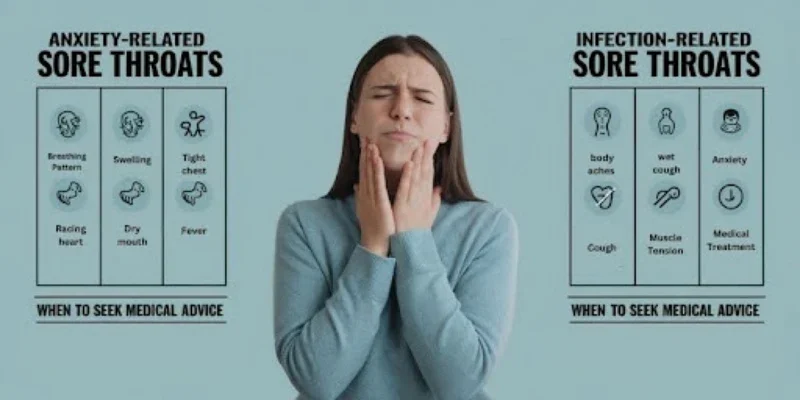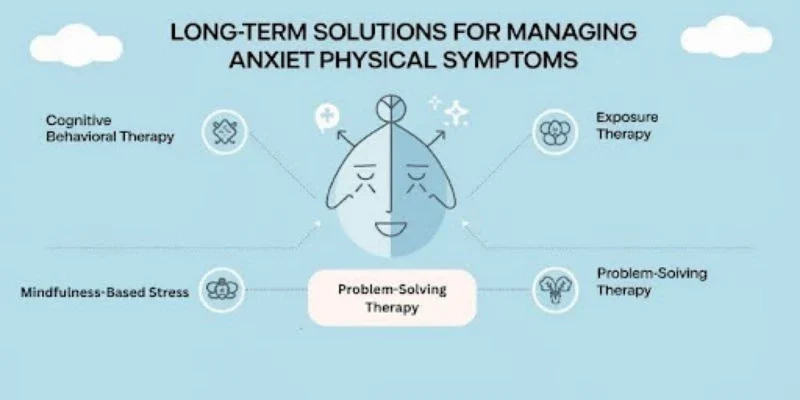EXPLORING THE LINK BETWEEN ANXIETY AND PHYSICAL SYMPTOMS
A sore throat is typically a symptom associated with infections like the common cold or strep throat. However, many people experience throat discomfort for a completely different reason: anxiety and stress. Physical symptoms of stress, such as headaches, stomach issues, and muscle tension, are widely recognized. Yet, the connection between stress and a sore throat may be less well-known. This article delves into the connection between stress and sore throats, provides tips on recognizing the symptoms, and shares both immediate and long-term strategies for relief.
How Stress and Anxiety Affect the Body
When a person feels stressed or anxious, the body responds with a series of physiological changes, primarily driven by the release of stress hormones like adrenaline and cortisol. These hormones prepare the body for a “fight-or-flight” response, causing reactions such as:
- Increased heart rate and blood pressure
- Rapid, shallow breathing or mouth breathing
- Muscle tension
Each of these responses can lead to throat discomfort or pain. While it’s essential to consult a physician to rule out infections or other medical conditions, understanding how anxiety can lead to sore throats may help individuals take proactive steps to alleviate symptoms.
How Does Stress Lead to a Sore Throat?
Stress is well known for causing a wide array of physical symptoms, and a sore throat is no exception. The physiological responses triggered by stress can lead to multiple symptoms in the throat region, creating discomfort or even pain. Understanding these connections can help individuals recognize when their sore throat might be stress-induced rather than stemming from a physical illness. According to the study, Environmental and Non-Infectious Factors in the Aetiology of Pharyngitis (Sore Throat), which highlights how non-infectious, environmental, and emotional factors can contribute to ongoing or recurrent sore throat symptoms;
“Emotional stress and stress-induced subjective factors may also play a role in throat discomfort, potentially in combination with muscle spasms. Excessive tension in the (para)laryngeal musculature—often influenced by psychological and emotional factors, vocal misuse, or as compensation for underlying issues such as infection—can result in pain or strain in the throat. This strain may even lead to the persistence of lesions in the mucosal lining of the larynx and pharynx, which can amplify soreness and make healing more challenging.”
Below, we explore the different ways stress can lead to throat discomfort.
Rapid Breathing and Dry Throat
When stressed, the body often shifts into “fight-or-flight” mode, causing rapid or shallow breathing. This change in breathing patterns can lead to mouth breathing, which significantly impacts throat health. Unlike breathing through the nose, which humidifies and warms the air, mouth breathing allows dry, unfiltered air to enter the throat, quickly leading to dehydration of the mucous membranes. This lack of moisture can create a scratchy, sore feeling in the throat, as the protective layer of saliva that typically lubricates the area is absent.
Chronic mouth breathing due to prolonged anxiety can exacerbate this discomfort, leading to more persistent soreness or dryness. Additionally, dry mouth and throat can make swallowing feel more uncomfortable, further intensifying the perception of soreness.
Tightness in Throat Muscles
Muscle tension is a common stress reaction, often manifesting in areas prone to tightness, such as the shoulders, neck, and throat. When stress levels increase, the muscles around the throat may contract involuntarily, leading to sensations of tightness or constriction. People often describe this sensation as a “lump in the throat,” which can be persistent and unsettling.
This tension is part of the body’s natural response to prepare for perceived threats, which results in tensed muscles throughout the body. However, unlike a temporary tensing, chronic stress can make this sensation last for prolonged periods, leading to ongoing discomfort. For some, the feeling can be so pronounced that it feels as though something is physically obstructing the throat, although there’s no actual blockage. This phenomenon, commonly known as “Globus sensation,” can be particularly troubling because it creates an ongoing cycle: as stress causes muscle tightness, the feeling of tightness itself can heighten anxiety.
Dysphonia: Strained Voice from Tension
Dysphonia, or voice strain, is a condition directly linked to stress-induced muscle tension in the throat. The muscles responsible for controlling the vocal cords may tighten when stressed, leading to issues such as hoarseness, cracking, or even pain during speech. This condition can be especially impactful for individuals who use their voice extensively, such as teachers, singers, or customer service workers. The physical strain from frequent talking, combined with stress-related tension, can make the throat feel raw and sore.
For those already experiencing voice strain, the awareness of their voice’s change can add to the stress, further perpetuating the discomfort. Unfortunately, dysphonia often doesn’t improve unless the underlying stress is managed. Without relief, individuals may experience worsening throat pain, especially if they attempt to push through the discomfort by speaking or singing as usual.
Anxiety-Related Sore Throat Symptoms:
Symptom | Cause |
Dry throat | Mouth breathing from anxiety |
Lump in the throat | Muscle tension from stress |
Voice cracking or hoarseness | Tension in the voice box muscles |
Difficulty swallowing | Heightened focus on swallowing due to anxiety |
Dysphagia: Difficulty Swallowing
Anxiety can also contribute to a condition known as dysphagia, or difficulty swallowing. This often occurs when an individual becomes overly focused on the act of swallowing, which can ironically make the process feel forced or uncomfortable. Anxiety-related dysphagia typically worsens as people continue to focus on their swallowing, heightening their stress and discomfort.
For some, the sensation can be so profound that it feels as though the act of swallowing itself is compromised, even though there’s no physical obstruction. This focus on swallowing can become a feedback loop: as anxiety heightens, individuals concentrate more on swallowing, making it feel increasingly difficult and uncomfortable. This loop can be especially distressing, as difficulty swallowing may be associated with severe medical conditions. Many people find themselves fearing these serious issues, which further fuels their anxiety and worsens the symptoms.
Globus Sensation: The “Lump” in the Throat
Globus sensation is a term used to describe the feeling of a “lump” or “ball” in the throat. This sensation, often stress-related, doesn’t involve any physical obstruction but can still feel remarkably uncomfortable and persistent. Research has shown that up to 96% of individuals who experience Globus sensation report a worsening of symptoms during high-stress periods.
The lump sensation can often feel so pronounced that individuals might be tempted to clear their throat constantly, which can worsen irritation in the throat. Although globus sensation itself isn’t dangerous, it can be troubling because it mimics more serious conditions, leading individuals to seek medical evaluations repeatedly. Often, no physical cause is found, which can lead to further anxiety and a feeling of helplessness.
Differentiating Anxiety-Related Sore Throats from Medical Conditions

Knowing whether a sore throat is due to stress or an infection is essential for proper treatment. Here are some indicators to help differentiate:
Symptom Type | Anxiety-Related Sore Throat | Infection-Related Sore Throat |
Breathing Pattern | Rapid, shallow, often through the mouth | Not necessarily affected |
Muscle Tension | Tight feeling in throat | Rare |
Swelling | Usually no visible swelling | Often includes swollen tonsils or glands |
Additional Symptoms | Tight chest, racing heart, dry mouth | Fever, body aches, nasal congestion, wet cough |
Symptom Duration | Improves as anxiety decreases | Persists or worsens without medical treatment |
If the sore throat diminishes as stress levels lower, it’s likely anxiety-related. However, if symptoms persist, worsen, or are accompanied by fever, fatigue, or congestion, it’s advisable to consult a doctor.
Short-Term Relief Techniques for Anxiety-Related Sore Throat
Several immediate techniques can relieve anxiety-induced sore throat symptoms, helping to interrupt the stress cycle and provide comfort.
- Paced Breathing (Square Breathing)
This breathing technique reduces immediate stress by calming the nervous system. Here’s a simple way to practice:- Breathe in through your nose for a count of four.
- Hold the breath for four seconds.
- Exhale slowly for four counts.
- Hold the breath for four counts again, and repeat.
- Practicing square breathing can reduce muscle tension and restore normal breathing patterns, preventing the dryness and irritation that contribute to a sore throat.
- Progressive Muscle Relaxation
Progressive muscle relaxation (PMR) involves consciously tensing, then releasing, each muscle group in the body. By focusing on each area, you can reduce built-up tension. PMR is particularly effective in releasing tightness in the shoulders, neck, and throat, where stress often manifests. Practicing PMR a few times daily can lead to a notable reduction in physical symptoms of stress, including sore throats. - Mindfulness Meditation
Mindfulness meditation focuses on the present moment, helping to quiet the mind and reduce anxious thoughts that may exacerbate physical symptoms. A popular method is the “STOP” technique:- Stop and pause.
- Take a breath.
- Observe what’s happening (thoughts, emotions, body sensations).
- Proceed mindfully.
- Mindfulness can break the mental cycle that perpetuates anxiety, calming the body and reducing throat-related symptoms over time.
- Distraction Techniques
Engaging in enjoyable activities like reading, puzzles, or listening to music can take your focus off anxiety-related physical symptoms. By shifting your mental focus, distraction techniques can provide relief from the sensations of anxiety and sore throat.
Long-Term Solutions for Managing Anxiety-Related Physical Symptoms

While immediate relief techniques can be helpful, chronic anxiety benefits more from structured, long-term solutions. Here are some methods to explore:
Therapy Type | Description |
Cognitive Behavioral Therapy (CBT) | CBT helps individuals recognize and challenge negative thought patterns, replacing them with more realistic perspectives. This can significantly reduce anxiety and the associated physical symptoms. |
Exposure Therapy | This approach gradually exposes individuals to anxiety-provoking situations, helping them manage their fears and reduce avoidance behaviors that fuel anxiety. |
Mindfulness-Based Stress Reduction (MBSR) | MBSR cultivates awareness of present-moment experiences, helping people manage anxious thoughts and improve emotional resilience. |
Acceptance and Commitment Therapy (ACT) | ACT emphasizes accepting uncomfortable feelings without judgment and taking action in line with personal values, reducing the need to control anxiety and physical symptoms. |
Problem-Solving Therapy | This approach teaches structured techniques for identifying and addressing stressors effectively, promoting a sense of control over life and anxiety. |
Preventing Anxiety-Related Sore Throats
Prevention can be challenging but is possible with consistency. Here are some steps to keep anxiety-related sore throats at bay:
- Practice Regular Breathing Exercises
Incorporating deep breathing into your daily routine can help reduce baseline stress levels and prevent episodes of rapid breathing that contribute to sore throats. - Stay Hydrated
Drink water or herbal tea throughout the day, particularly if you notice signs of mouth breathing. A lubricated throat is less likely to feel sore. - Engage in Regular Exercise
Physical activity releases endorphins, natural mood enhancers that can lower anxiety and improve overall well-being. - Avoid Triggers
Reduce intake of stimulants like caffeine, which can exacerbate anxiety symptoms. Minimize alcohol and tobacco, as both can heighten anxiety after their effects wear off. - Get Quality Sleep
A lack of sleep can worsen anxiety symptoms, including physical manifestations. Establish a calming nighttime routine, avoid screens before bed, and ensure your room is quiet, cool, and dark. - Practice Daily Relaxation Techniques
Integrate relaxation techniques, such as meditation, yoga, or breathing exercises, into your day to manage anxiety and avoid the build-up of stress hormones.
When to Seek Medical Help
Occasional anxiety-related sore throats aren’t typically a cause for concern. However, if you experience the following, it may be time to consult a healthcare provider:
- Persistent or worsening sore throat
- Difficulty swallowing that doesn’t improve
- Frequent anxiety attacks impacting daily life
- Physical symptoms that disrupt normal activities
A doctor can help identify any underlying conditions, such as GERD or allergies, which might be contributing to the sore throat, ensuring a comprehensive treatment approach.
Anxiety can cause a variety of physical symptoms, including sore throats. When anxiety strikes, the body’s response includes rapid, shallow breathing and muscle tension, which can lead to throat discomfort. Short-term techniques like paced breathing and mindfulness can provide immediate relief, while long-term therapies, such as CBT, can address the root causes of anxiety. Preventing stress-related sore throats involves incorporating healthy lifestyle habits and stress management techniques into daily life.
Get the Support You Deserve For Anxiety?
If anxiety-related symptoms are impacting your well-being, it’s time to take action. TelePlus Care offers accessible, professional mental health support, including telehealth consultations and customized therapeutic options. Don’t let anxiety disrupt your daily life—reach out to TelePlus Care today and start your journey to a healthier, stress-free life.
Call TelePlus Care today to book a consultation and talk to an Online Mental Health Therapist in Alberta.





